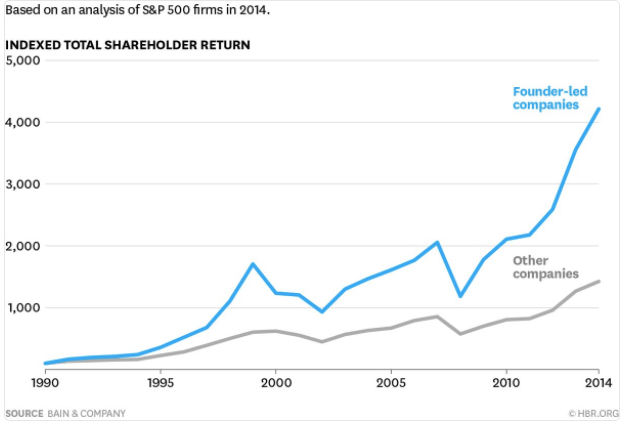What We’re Reading
Here are a few good articles the Collaborative Fund team came across this week.
Life’s work
Founder-led public companies perform better than others, according to Bain data:
Automation
Humans are still better than machines when work is variable and inconsistent. So Driscoll, the berry company, is making its berries more consistent:
Eventually, harvesting might not be done by humans at all. Driscoll’s is working with Spanish technology company Agrobot to develop a robot that will do the picking instead. The company’s breeding team, meanwhile, is working on berries that grow at consistent stem lengths so they can be picked by the machine. This isn’t a far-fetched concept. Madesko predicts there will be a strawberry-picking Agrobot in five years. “It’s not an if, but a when,” he said.
Connection
There are few limitations to Elon Musk’s ambition to solve really big problems:
Elon Musk’s SpaceX wants to launch thousands of satellites into space with the aim of providing super-fast global internet coverage, according to a regulatory filing.
SpaceX – the company on a mission to colonize Mars – outlined plans to put 4,425 satellites into space in a Federal Communications Commission (FCC) filing from earlier this week.
More space
This is a great example of how technology will make city living more efficient:
Near downtown Los Angeles, new residents at the 41-unit Eleanor Apartments now receive $100 in Uber concessions every month instead of on-site parking spaces.
Innovation
A little optimism amid an otherwise depressing month:
Scientists have discovered a new way to edit DNA that could fix “broken genes” in the brain, cure previously incurable diseases and potentially even extend the human lifespan.
The breakthrough – described as a “holy grail” of genetics – was used to partially restore the sight of rats blinded by a condition which also affects humans.
Book: How Not to be Wrong: The Power of Mathematical Thinking
A wonderful book by Jordan Ellenberg on how math works in the real world (as opposed to the chalkboard). He links together real stories that anyone can grasp to show how a deeper appreciation of math helps explain the world in ways you probably hadn’t thought of before.
“To paraphrase Clausewitz,” Ellenberg writes, “Mathematics is the extension of common sense by other means … it’s the study of things that come out a certain way because there is no other way they could possibly be.”
Have a great weekend.